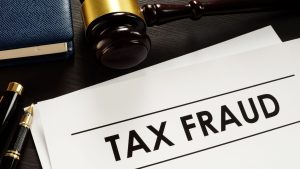Table of Contents
ToggleTax fraud and evasion can harm public services and place unfair financial burdens on law-abiding taxpayers. To maintain a fair and transparent tax system, HM Revenue and Customs (HMRC) encourages individuals to report suspected tax fraud.
But what happens when you report someone to HMRC? This guide explores the process, from submitting a report to the outcomes of investigations, ensuring you understand the role you can play in maintaining tax compliance in the UK.
Why Report Tax Fraud?

Tax fraud is not just a financial crime, it impacts society as a whole. When individuals or businesses evade taxes, it reduces the funds available for essential public services like education, infrastructure, healthcare and social care, placing a heavier burden on law-abiding taxpayers.
Reporting tax fraud helps uphold the integrity of the tax system and ensures that everyone contributes their fair share to support community development.
By taking action against suspected tax fraud, individuals and businesses also help create a level playing field. Honest taxpayers and compliant businesses should not face unfair competition from those who gain an advantage by breaking the law.
Additionally, reporting tax fraud sends a strong message that tax evasion will not be tolerated. It acts as a deterrent for others, fostering greater compliance and fairness in the system. Protecting public funds is a collective responsibility, and by reporting fraudulent activity, you play a vital role in strengthening the economy and ensuring justice.
Who Can Be Reported to HMRC?
Tax fraud can be committed by various individuals and entities, including:
- Individuals: Failure to declare all sources of income.
- Businesses: Underreporting profits or engaging in VAT fraud.
- Employers: Falsifying payroll records to avoid National Insurance contributions.
- Landlords: Not declaring rental income.
Common signs of tax fraud include discrepancies in financial records, missing VAT registrations, or cash-only dealings designed to evade tax.
How to Report Tax Fraud to HMRC?
Reporting tax fraud to HMRC is straightforward and confidential. Here’s how you can do it:
- Fraud Hotline: Call HMRC’s fraud hotline to speak directly to a representative.
- Online Reporting Form: Complete the tax fraud report form on HMRC’s website.
- Postal Reporting: Send your report via post to the HMRC fraud department.
It’s helpful to provide detailed information such as names, addresses, and the nature of the suspected fraud.
What Happens After a Report Is Filed?

When HMRC receives a report of suspected tax fraud or non-compliance, it follows a systematic process to handle the information effectively and fairly. Here’s an overview of what happens next:
1. Initial Assessment
HMRC begins by evaluating the report to determine the relevance and accuracy of the information provided. This includes verifying the details, cross-referencing with existing records, and checking if the case falls within their jurisdiction. Reports with sufficient evidence and clear information are more likely to proceed to the next stage.
2. Prioritisation of Cases
Once the report is assessed, HMRC prioritises cases based on their potential impact. Factors like the amount of unpaid taxes, the severity of the suspected fraud, and the likelihood of recovery are considered. High-priority cases, such as those involving significant amounts or repeat offenders, are given precedence over minor discrepancies.
3. Assignment to Investigation Teams
If the case warrants further action, it is assigned to HMRC’s Fraud Investigation Service or another relevant department. These specialized teams have the expertise to handle complex tax fraud cases, conduct in-depth investigations, and take appropriate enforcement actions when necessary.
4. Thorough Review of All Reports
While not every report leads to immediate action, HMRC ensures that all submissions are reviewed thoroughly. Reports lacking sufficient evidence may be logged for future reference or combined with other intelligence if patterns of non-compliance emerge.
5. Next Steps
For cases that progress, HMRC may initiate an investigation, contact the individuals or businesses involved, or collaborate with other authorities. Outcomes can range from audits and compliance checks to legal action or penalties. Regardless of the result, the structured approach ensures fairness and integrity in addressing tax fraud.
Inside the HMRC Investigation Process
1. Case Assessment and Initiation
HMRC begins by assessing the case to determine whether an investigation is necessary. This includes reviewing initial evidence, identifying potential tax discrepancies, and classifying the case based on its complexity.
2. Evidence Collection
Once an investigation is launched, HMRC gathers relevant evidence through various methods. These can include examining financial records, conducting audits, and interviewing individuals or businesses involved. The goal is to verify the accuracy of tax declarations and uncover any discrepancies.
3. Compliance Monitoring
During the investigation, businesses or individuals under scrutiny may be subject to ongoing compliance checks. This involves regular reviews of financial activities to ensure that they are adhering to tax laws while the investigation is underway.
4. Collaboration with Other Authorities
In complex cases, HMRC often collaborates with other legal, financial, and international authorities. This cooperation helps in gathering additional evidence, identifying hidden assets, or tracing cross-border transactions that may be involved in tax evasion.
5. Resolution and Penalties
After collecting evidence and completing the investigation, HMRC takes appropriate actions. This may include issuing penalties, demanding repayment of owed taxes, or even pursuing legal action in severe cases. The resolution process ensures that violations are addressed, and fairness in the tax system is upheld.
What HMRC Does with the Findings?

After concluding an investigation, HMRC carefully evaluates the findings to determine the most appropriate course of action based on the severity of the offense and the evidence collected. Here are the possible outcomes:
1. Financial Penalties
In most cases, offenders are subject to financial penalties. This could include fines, repayment of the unpaid taxes, and additional interest charges to cover the delay. The penalties aim to recover lost public funds while discouraging future non-compliance.
2. Prosecution and Criminal Charges
For severe cases involving deliberate tax evasion or fraud, HMRC may pursue criminal charges. Offenders found guilty in court could face imprisonment, confiscation of assets, or both. Prosecution is reserved for cases where there is substantial evidence of intentional wrongdoing.
3. Compliance Orders and Monitoring
In some situations, businesses or individuals may be placed under stricter compliance monitoring. This ensures that they adhere to tax laws moving forward and prevents further violations.
4. Public Disclosure of High-Profile Cases
To deter others from engaging in tax fraud, HMRC occasionally publicizes high-profile cases. Public disclosures serve as a warning about the consequences of non-compliance and highlight the seriousness of tax fraud offenses.
5. No Further Action in Some Cases
If the investigation finds insufficient evidence of wrongdoing, HMRC may decide not to take further action. However, the information may be stored for future reference if additional reports or patterns of non-compliance emerge.
By addressing tax fraud appropriately, HMRC upholds the integrity of the tax system, ensures fairness, and helps maintain public trust in its processes.
Consequences for Tax Fraud Offenders
Tax fraud can lead to significant repercussions, such as:
- Fines and Penalties: Amounts vary depending on the severity of the offence.
- Legal Action: Severe fraud can result in imprisonment.
- Reputational Damage: Businesses found guilty may suffer loss of trust and financial credibility.
Protections for Whistleblowers
HMRC takes measures to protect whistleblowers, including maintaining their anonymity throughout the reporting process. UK laws also safeguard individuals against retaliation, ensuring they can report without fear of consequences.
Misconceptions About Reporting Tax Fraud

Many individuals hesitate to report tax fraud due to common myths and misunderstandings about the process. Addressing these misconceptions can encourage more people to come forward and contribute to a fairer tax system.
1. Fear of Being Identified
One of the most prevalent concerns is the fear of being identified as the whistleblower. However, HMRC allows reports to be submitted anonymously. Personal details are not required, and any information provided is handled with strict confidentiality, ensuring the safety and privacy of those making the report.
2. Fear of Consequences for False Accusations
Some worry about being penalized for submitting a report that turns out to be incorrect. It’s important to note that HMRC does not take action against individuals who report suspected tax fraud in good faith, even if their suspicions are later proven unfounded.
HMRC thoroughly investigates every report to verify its accuracy before taking further steps, ensuring that no innocent parties are wrongfully accused.
3. Expectations of Financial Rewards
In some countries, whistleblowers may receive monetary rewards for reporting tax fraud. However, the UK does not generally offer financial incentives for such reports.
Instead, reporting is viewed as a civic duty, contributing to the proper functioning of public services and fairness in the tax system. The focus is on addressing tax evasion rather than incentivizing reports with financial gains.
By debunking these misconceptions, individuals can feel more confident in reporting suspected tax fraud, knowing that the process is fair, confidential, and aimed at creating a level playing field for all.
Encouraging Vigilance in Tax Compliance
The public plays a critical role in ensuring tax fairness. By staying vigilant and reporting fraudulent activities, individuals and businesses contribute to a fairer society. HMRC also offers resources to educate the public about tax compliance.
Conclusion
Reporting tax fraud is an essential step in maintaining fairness and integrity in the UK’s tax system. By understanding the process and taking action, individuals can help ensure that everyone contributes their fair share. If you suspect tax fraud, don’t hesitate to use HMRC’s confidential reporting services.
FAQ
Can tax fraud reports be traced back to the reporter?
No. HMRC ensures confidentiality, and reports can be made anonymously.
What should you do if you suspect your employer of tax fraud?
You can report them through HMRC’s hotline or online form. Ensure you provide relevant details without confronting the employer directly.
Is there a reward for reporting tax evasion?
In the UK, whistleblowers typically do not receive financial rewards, but they are protected by law.
How is the information provided verified by HMRC?
HMRC conducts a thorough investigation, cross-checking data and collecting evidence to validate the report.
What happens if a report turns out to be false?
HMRC dismisses baseless reports without penalising the reporter, provided the report wasn’t intentionally misleading.
Can businesses report competitors engaging in fraud?
Yes, businesses can report suspected fraudulent activities to HMRC through the same channels.
Are HMRC’s resources accessible for non-English speakers?
HMRC provides assistance and resources in multiple languages to accommodate diverse needs.



